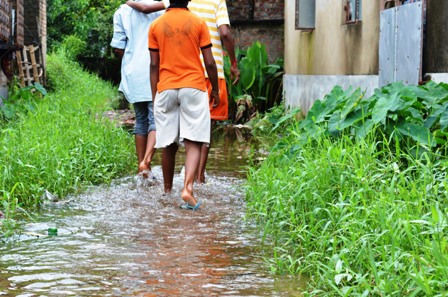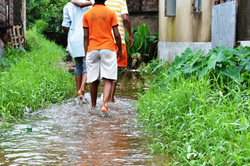How do people in South Asia live with climate change? Insight into Climate Asia reports

How do people in Asia live with climate change now? How will it impact their future and how will they shape their own environment? These are the questions behind Climate Asia, a BBC Media Action study – the largest ever carried out so far – of people’s experience of climate change in seven Asian countries (Bangladesh, China, India, Indonesia, Nepal, Pakistan and Vietnam). Using both quantitative and qualitative research, the Climate Asia team surveyed more than 33,500 people in the region and built a picture of how they live and deal with climate change. Based on the principle that understanding people’s perceptions is crucial to develop communication that motivates them to take action, the project looked into the most effective ways for governments, organizations, business and media to communicate with the relevant target groups and support them to adapt to climate change.
Based on the Climate Asia country reports, ICLEI South Asia has compiled a brief summary of the main findings for the South Asian countries part of the study. The Bangladesh, India, Nepal and Pakistan full reports can be downloaded at the end of this article.
BANGLADESH
Most vulnerable to the effects of climate change, Bangladesh has a history of cyclones and floods. Compared to 10 years ago, people are now experiencing higher temperatures, lower rainfall and less predictable weather, with an impact on livelihoods and health. People feel that the effects of these changes are being exacerbated by human activity such as population growth and the use of fertilisers.
62% of those interviewed are aware of the term ‘climate change’ and around 42% feel well informed about the things they could do to cope with its impacts on water, food and energy supply. 61% do feel the need to make changes to their current jobs and livelihood to better cope with these impacts; 36% have already started making such changes, including migrating, supplementing their income in different ways or growing different crops. Only 29% of the people surveyed feel that the national government is taking the necessary actions to help respond to changes in water, food, energy supplies or weather.
While there already seems to be a certain level of awareness and individual initiative, these actions need to be further encouraged and built on. Targeted communication should build on people’s already existing sense of responsibility to take action. It can also make use of Bangladesh’ strong sense of community engagement and co-operation by building networks between people to share information, encourage discussion and raise awareness as well as by showcasing examples of good practice to inspire them to act. TV and mobile phones are used regularly by the majority of people, making these good outreach channels; face-to-face communication remains however the preferred way of interaction.
INDIA
Increased temperatures and decreasing rainfall and the consequent shortage of water seems to be the biggest concern for people in India. All around the country, people have noticed decreases in water availability and are worried about the lack of sufficient drinking water. The water shortages are leading to failing crops, need of additional fertilisers with corresponding increasing expenses and health concerns.
Only 44% of the people interviewed are aware of the term ‘climate change’ and around 40% feel well informed about the things they could do to cope with its impacts on water, food and energy supplies. While some people are taking action, 36% of those who are experiencing climate change impacts are neither adapting to them nor willing to act in the future. 41% feel the need to make changes to their current job and livelihood to better cope with these impacts, but only 26% have already started making changes to their livelihoods. 30% of the interviewees think that the national government is taking the necessary actions to help respond to changes in water, food, energy supplies or weather; the rest feel that the government should support them more and that there is nothing they can do as individuals that could resolve this problem.
To engage Indians in climate change measures and increase their willingness to act, there is a need to use a different communication approach, such as framing the issue of climate around key issues like water shortage, and looking at personal impacts such as reduced income and health concerns. This will help to build awareness of both immediate and future risks that people face in their everyday lives. Communication should make wide use of television, which was found to be the most reliable and commonly used source of information, and then seek to enhance this with face-to-face communication whenever appropriate. There is also a role for partnerships between television, non-governmental organisations (NGOs) and government to increase trust in the needed interventions and create new opportunities to bring the issue of climate change to life.
NEPAL
The impact of climate change is a huge issue in Nepal, where over 19 million people live off the land. People feel that crop productivity has decreased because of changes in seasons, unpredictable rainfall, drought and floods.
42% of people are aware of the term ‘climate change’ and around 44% feel well informed about the things they could do to cope with its impacts on water, food and energy supplies. 82% do feel the need to make changes to their current job and livelihood to better cope with these impacts, but only 20% have already started making changes to their livelihoods. 49% of those surveyed are willing and ready to make changes to be better prepared for floods and droughts, deal with water shortages and preserve their environment but are finding it difficult to act, due to the lack of financial resources and of sufficient and relevant information. As of now, 45% of the people of Nepal are quite confident that the national government is taking the necessary actions to help respond to changes in water, food, energy supplies or weather. However, 16% also feel that there is more that the government should do to provide them with the necessary support.
To assist the large percentage of people willing to make changes – but struggling – communication can build on the Nepalese strong sense of community by encouraging discussion to share practices, build skills and inspire others. While posters, leaflets, training and NGO’s village awareness campaigns are the main sources of information in Nepal, the opinion of friends, family, neighbours and local elders seem to matter a lot; an effective awareness raising campaign should thus capitalise on both. Unlike in the other countries surveyed, more people have access to a radio than a television, especially in remote, rural areas and this should be considered when selecting the appropriate communication channels.
PAKISTAN
54% of the people interviewed in Pakistan think life has become worse in contrast to their counterparts across the South Asian region. People across the country are experiencing unpredictable rainfall, increased temperatures and changes to the season patterns.
50% of people are aware of the term ‘climate change’ and around 33% are well informed about the things they could do to cope with its impacts on water, food and energy supplies. 48% of the people of Pakistan do feel the need to make changes to their current job and livelihood to better cope with these impacts and 38% have already started making such changes. The confidence of the people in the government with respect to taking any initiative against climate change and its impacts is very low. According to the survey, only 6% of the people feel that the national government is taking the necessary actions to help respond to changes in water, food, energy supplies or weather. Compared with the other countries in this study, people in Pakistan feel most strongly that these changes are currently having a high level of impact on their lives. This feeling has driven Pakistanis to act, as the biggest motivator is the need to survive. Feeling that the government’s support will be limited, people have started to take action themselves by working together in their communities or through the support of NGOs.
In Pakistan, the role for communication is twofold: to support people who are already taking action to respond more appropriately and to inspire and empower those who are struggling to act. For those who are already taking action, there is a need for practical information on possible measures, such as saving water, changing agricultural practices to improve crops, or learning alternative skills to supplement income. Those without access to resources, relevant information or community support are not able to cope and feel helpless. The availability of information on how to act thus plays an important role in encouraging people to take the necessary steps, as those who feel better informed are adapting more to the changes. Television is the most accessed medium both in urban and rural areas: 74% of the people currently get information on issues discussed today (water, food, energy, extreme weather) through television, making this the most efficient medium to spread awareness of climate change and ways to act upon it.
Country-specific climate reports can be found below:
Bangladesh report (English version)
Bangladesh report (Bengali version)
India report (English version)
Nepal report (English version)




